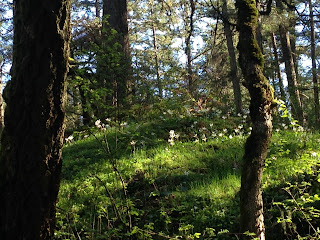Finally this post! This one is a bit of a long one, but ethics are important, so it's worth it. The week following the presentation on research data management plans, Dr. Natalie Ban also organized a discussion-based workshop on research ethics with Human Resources Ethics Coordinator Ms. Eugenie Lam. Since several of the students in the new cohort of graduate students this year were beginning or in the middle of their ethics applications, it seemed like a good time to check in with Ms. Lam to ask any questions.
I went because I really enjoy thinking about research, and had to submit my own ethics application for my thesis research. I also attended this presentation with a few specific questions around technology and ethics: how best to gather and store confidential data using the internet? Are there any best practices around what technologies/programs we can or should use? Or should not use?
 |
| A fairy hill of fawn lilies at Thetis Lake! |
You want to take a look at the application form early into the semester, not only because you get a sense for the kind of information you need to think about, but also because the form is so detailed, it may actually help you with the design of your study.
 |
| More lovely quince! |
You should complete your ethics application before you gather any data, but it's a good idea to make some initial contact with some of the folks in the community you want to study (speaking from a qualitative/interview-based research perspective), whether to suss out your initial research questions, or just get a sense of whether your project is possible/worthwhile/interesting. An observation from Ms. Lam at the session was that if you want to conduct research with First Nations communities, you likely need to either have pre-existing connections to the community you want to study, or you will need to rely heavily on pre-existing relationships that your supervisor has established, otherwise it will be very difficult to quickly build the trust, rapport, and relationships you typically need to recruit participants for your study. There is often an expectation that work with specific communities will also result in co-benefits for the participants or community as well, so keep that in mind, too.
Once your application is approved, it will be valid for one year. I highly recommend filling out the simple form to extend the duration of your application even if you are already writing your thesis and all your data collection is complete; you never know what might come up, and it's much easier to fill out a 2 page form, than to go through a whole new application if you didn't renew but need to go collect more data or something. Don't do that to yourself.
 |
| Afternoon Thetis Lake reflection. |
What I also recommend is talking to other students in cohorts before yours, or other students of your supervisor's, or your supervisor's own work. If they have done similar research to yours, see if you can get a copy of their ethics application. Ms. Lam stated that the Ethics Board isn't able to keep A+ ethics applications from other researchers (I asked, because I do really well with models), but also recommended talking to your supervisor. Seeing how someone else thinks through similar questions can be incredibly helpful, and I know helped my own thinking along. If you want a copy of my ethics application, please drop me a line. I'd be happy to send it along, as long as it's only for your individual use.
Did I get my questions answered during this presentation? Well, yes and no. Turns out that there don't seem to be any best practices for how to gather data using the internet, Skype, or Google Hangouts... the best that you can do is be transparent with your participants so they know that you're using Skype or whatever the technology is, in order to talk to them.
Carrying through on due diligence for your research ethics ensures that you know how you're recruiting your participants, what you'll say, what you're asking from them, how you're going to obtain that data, what you will do with that data afterwards, and how you'll store if past your project.
So while it will take a good bit of work to think through the ethics application form, it can also be fun, and by the end of it, you'll know how to engage with your participants in an ethical, respectful, and safe way.
No comments:
Post a Comment